This article examines effective internet marketing strategies designed for hotels aiming to boost bookings, underscoring the critical role of a robust digital presence in a competitive marketplace. It identifies various tactics—such as SEO, social media marketing, and influencer partnerships—that can significantly improve visibility and drive direct reservations. By implementing these strategies, accommodations can ultimately enhance their revenue. The insights provided serve not only to inform but also to empower hotel and restaurant owners to take decisive action in their marketing efforts.
In a digital landscape where over 80% of travelers rely on the internet for booking their stays, hotels confront an urgent imperative to refine their marketing strategies. This article explores ten innovative internet marketing strategies tailored for the hospitality sector, providing valuable insights on enhancing online visibility, engaging potential guests, and ultimately increasing bookings. As competition intensifies, one critical question emerges: which of these strategies will be most effective in transforming casual browsers into loyal customers?
Lights On provides a comprehensive suite of internet marketing hotel solutions tailored for the hospitality sector, which includes:
In an era where over 80% of global travelers prefer to research and book accommodations online, internet marketing hotel is crucial for establishing a robust digital presence and achieving success. By leveraging data-informed insights, Lights On empowers accommodations to refine their promotional strategies, effectively engaging potential guests and maximizing occupancy rates.
Furthermore, the company's advanced revenue management services, which include:
significantly enhance financial performance. This positions Lights On as a strategic ally in navigating the competitive hospitality landscape. Effective internet marketing hotel strategies, including personalized PPC advertising and impactful social media engagement, can substantially boost revenue for accommodations. Some establishments have reported revenue growth ranging from 10% to 30% through targeted efforts.
To elevate advertising quality, consider implementing for your campaigns. In addition, fostering customer loyalty can be achieved by introducing a rewards program that incentivizes repeat visits. As the industry continues to evolve, adopting these strategies is not merely advantageous but essential for sustained growth and profitability.
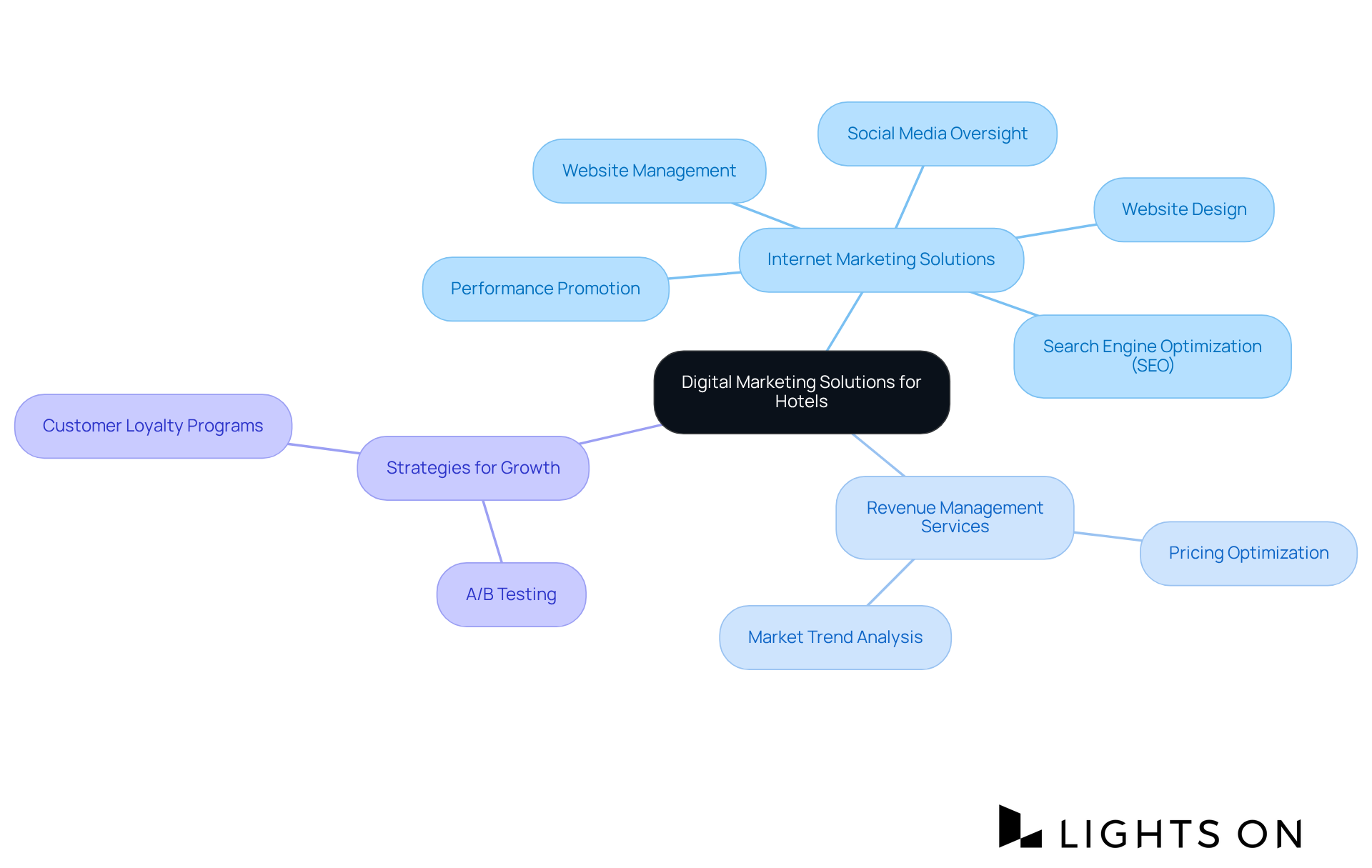
Utilizing as part of internet marketing hotel empowers accommodations to precisely target specific demographics and geographic regions, ensuring that promotions reach prospective visitors at the most opportune moments. By concentrating on keywords that resonate with their unique offerings, accommodations can effectively use internet marketing hotel strategies to craft compelling advertisements that funnel visitors directly to their reservation pages.
Remarketing strategies in internet marketing hotel are crucial in this context, allowing accommodations to re-engage guests who abandoned their reservations. This method not only boosts conversion rates but also significantly increases direct bookings via internet marketing hotel techniques. In 2025, accommodations utilizing internet marketing hotel techniques with Google Ads reported average conversion rates that underscore the effectiveness of customized campaigns, with successful implementations generating substantial increases in direct revenue. For example, a particular campaign yielded £17,200 in direct revenue from a £1,000 investment.
Best practices for internet marketing hotel include:
Notably, accommodations utilizing internet marketing hotel strategies have witnessed remarkable outcomes, with conversion rates on mobile travel websites soaring by 88% over the past year. Additionally, employing internet marketing hotel strategies by bidding on one's own brand name is vital for competing with OTAs, ensuring accommodations remain visible in a saturated market.
Employing Google Analytics for tracking campaign performance further underscores the necessity of data-driven strategies in the context of internet marketing hotel, enabling accommodations to refine their advertising efforts effectively. To maximize effectiveness, establishments should consider A/B testing various ad formats and messaging to identify what resonates most with their audience.
Overall, these strategies illustrate the transformative potential of internet marketing hotel through Google Ads within the competitive hospitality landscape.
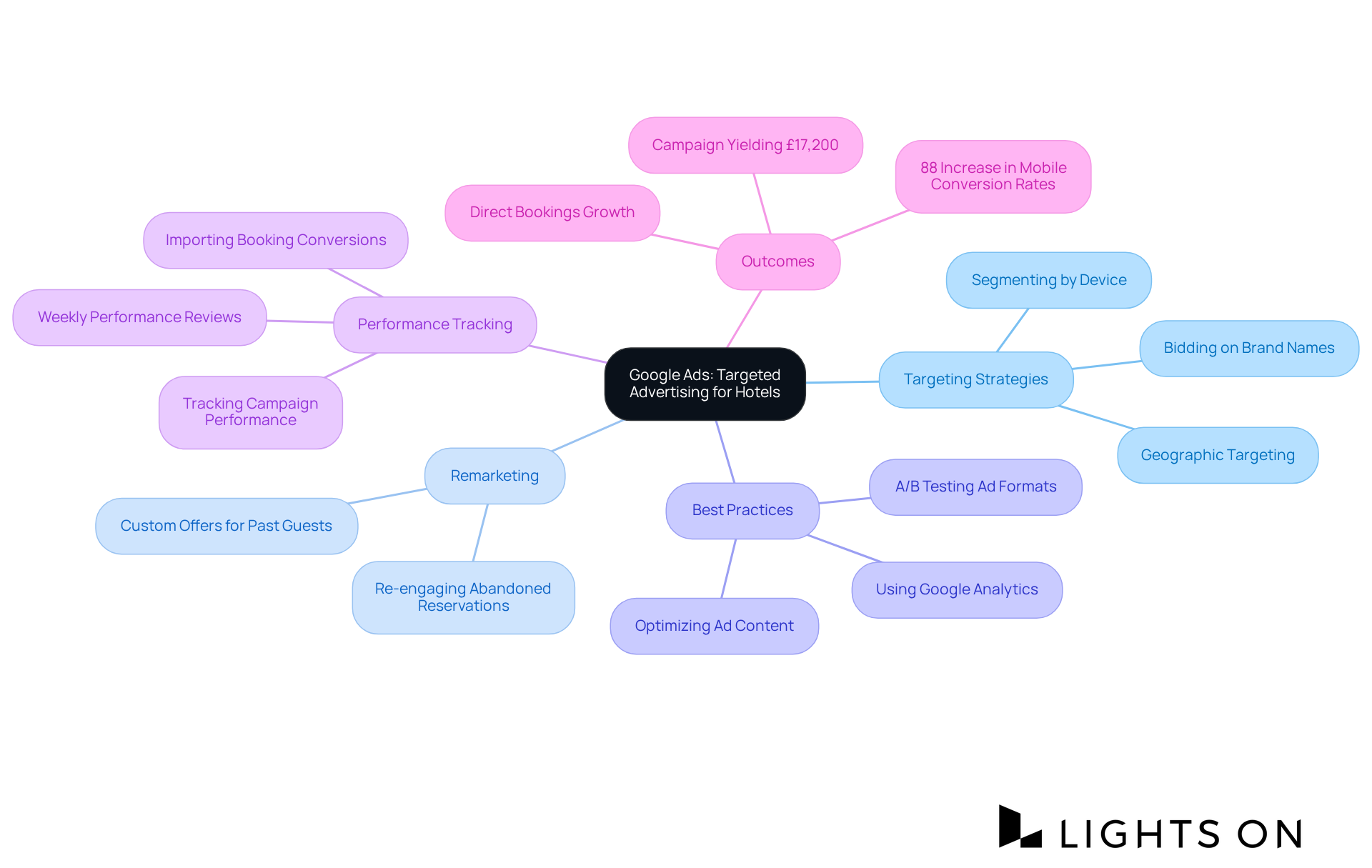
Implementing effective SEO strategies is essential for an internet marketing hotel aiming to boost its online visibility and increase bookings. This challenge can be addressed by with relevant keywords, enhancing site speed, and ensuring mobile-friendliness. High-quality content that addresses the needs and interests of prospective visitors not only enhances search engine rankings but also encourages engagement.
Furthermore, local SEO practices, such as optimizing Google My Business listings and creating location-specific landing pages, are particularly impactful. For instance, accommodations can motivate pleased visitors to submit favorable feedback on their Google My Business profile, which can greatly improve local search visibility. Additionally, producing blog material that emphasizes local attractions and events can attract prospective visitors looking for lodging in specific regions.
In fact, establishments that prioritize local SEO can draw more visitors from their immediate vicinity, thereby reducing dependence on expensive online travel agencies (OTAs). As we move into 2025, the significance of local SEO in internet marketing hotel will only increase, making it a crucial element of any effective digital promotion approach in the hospitality sector.
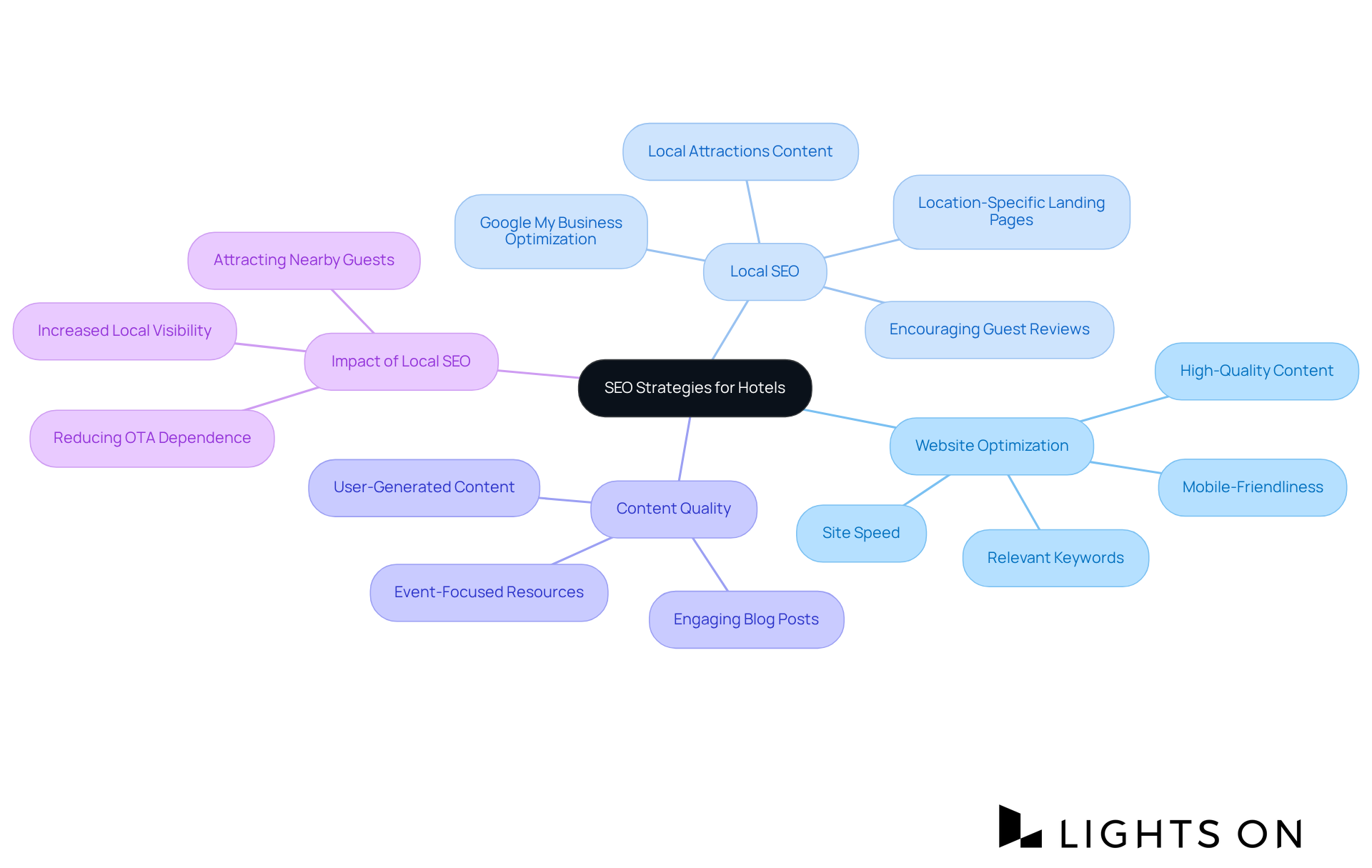
Social media marketing empowers accommodations to highlight their unique features and interact with potential visitors in real-time. By sharing visually captivating content—such as stunning photos and engaging videos of the property, local attractions, and unforgettable visitor experiences—hotels can establish a compelling online presence. Incorporating video content, including virtual tours, effectively showcases hotel amenities and heightens guest interest.
Furthermore, targeted advertising campaigns on platforms like Facebook and Instagram significantly boost visibility, driving traffic to reservation pages. Actively engaging with followers through comments and direct messages fosters a sense of community, encouraging loyalty and repeat bookings.
To maximize engagement, accommodations should leverage location and in their posts, as studies indicate that posts with these tags receive 79% more interaction than those without. This dynamic strategy in internet marketing hotel not only emphasizes the establishment's brand but also cultivates lasting connections with visitors, ultimately leading to increased occupancy and revenue.
As Megha Sharma observes, "Social media is a resource if you aim to distinguish yourself, draw visitors, and boost reservations in 2025.
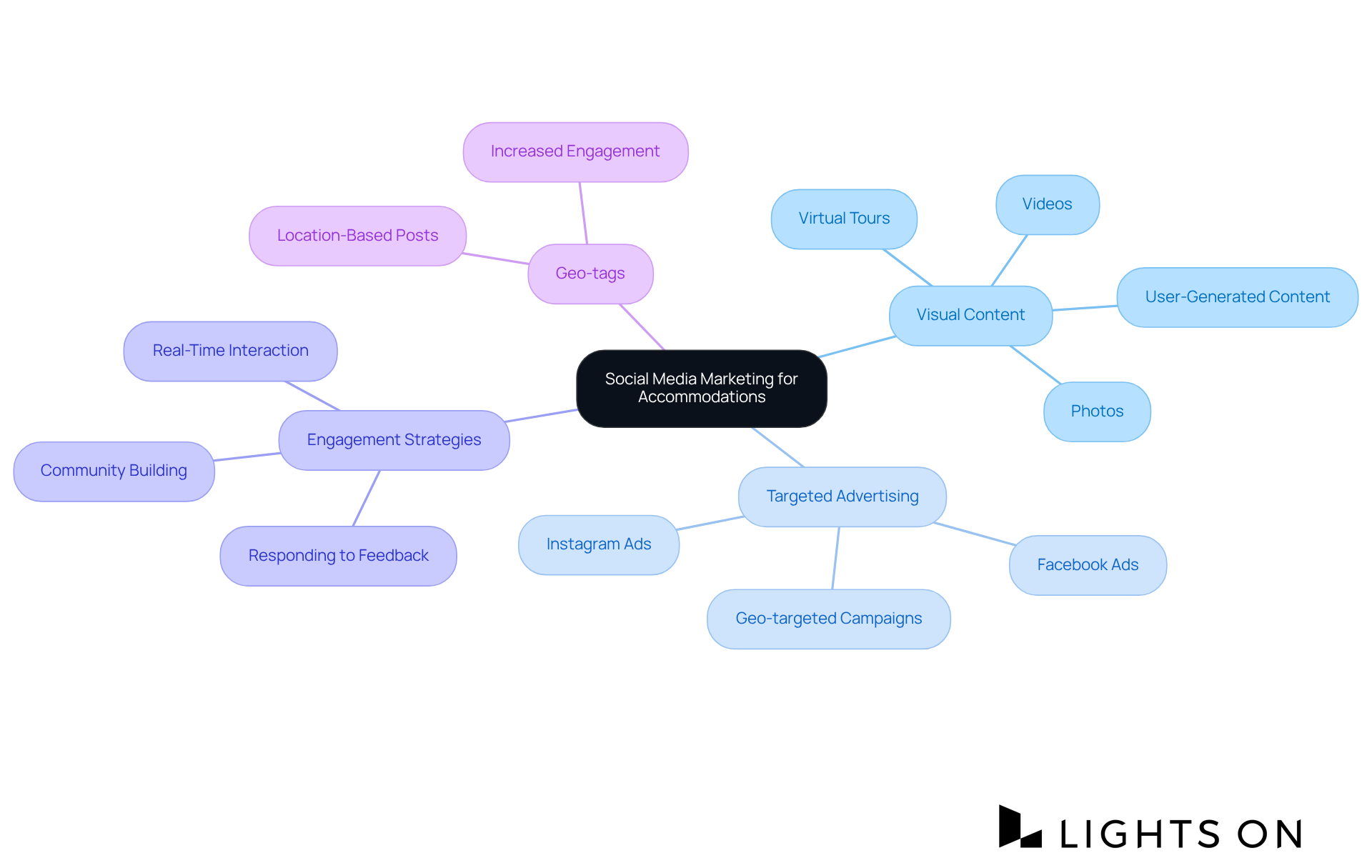
Email marketing serves as a vital resource in internet marketing hotel strategies for accommodations aiming to forge lasting connections with former guests and stimulate repeat bookings. By segmenting email lists based on visitor preferences and behaviors, establishments can tailor their communications for a more significant impact.
By leveraging these strategies in internet marketing hotel, accommodations can effectively increase engagement, foster loyalty, and ultimately drive more direct bookings and revenue.
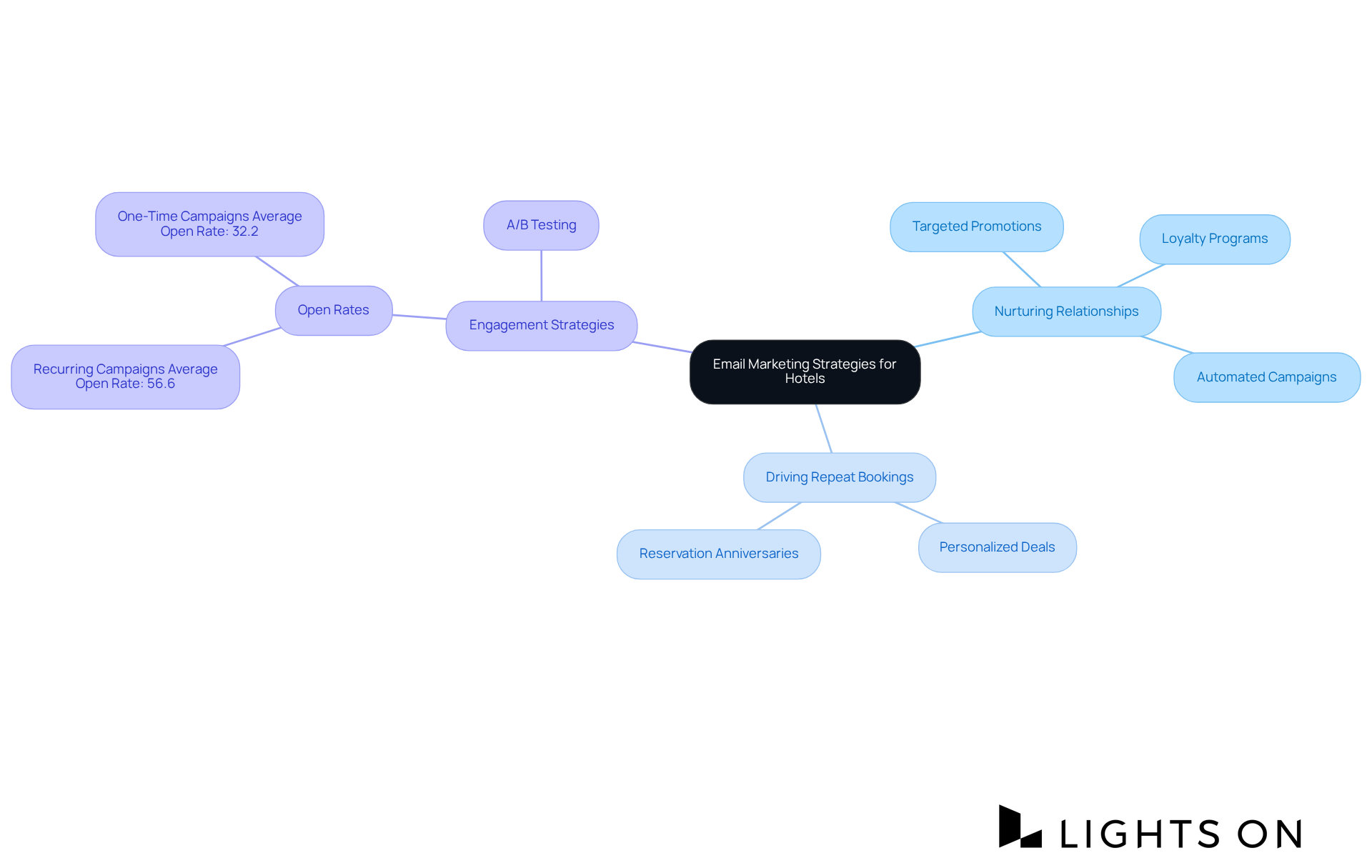
Content promotion is essential for accommodations aiming to highlight their unique features, including special amenities, nearby attractions, and unforgettable visitor experiences. By consistently maintaining a blog that showcases travel tips, local events, and behind-the-scenes stories, accommodations can effectively engage potential guests while enhancing their search engine optimization (SEO). Indeed, content marketing can significantly elevate visibility, as video content generates 1200% more shares than text and images combined, positioning it as a powerful tool for engagement.
High-quality visuals, paired with compelling storytelling, foster an emotional connection with the audience, motivating them to choose the accommodation for their next visit. For instance, the Marriott Bonvoy Traveler magazine successfully captivates potential visitors by sharing inspiring narratives about travel destinations, which enhances brand awareness and drives reservations. Additionally, user-generated content, such as authentic guest experiences shared on social media, builds trust and authenticity, increasing the likelihood of potential visitors selecting a lodging option.
As we approach 2025, accommodations must prioritize innovative content strategies that resonate with travelers. This entails leveraging on platforms like TikTok and Instagram Reels to showcase distinctive accommodations and local experiences. By aligning their strategies with the interests of modern travelers, hotels can utilize internet marketing hotel techniques to craft an engaging narrative that not only attracts visitors but also enriches their overall reservation experience.
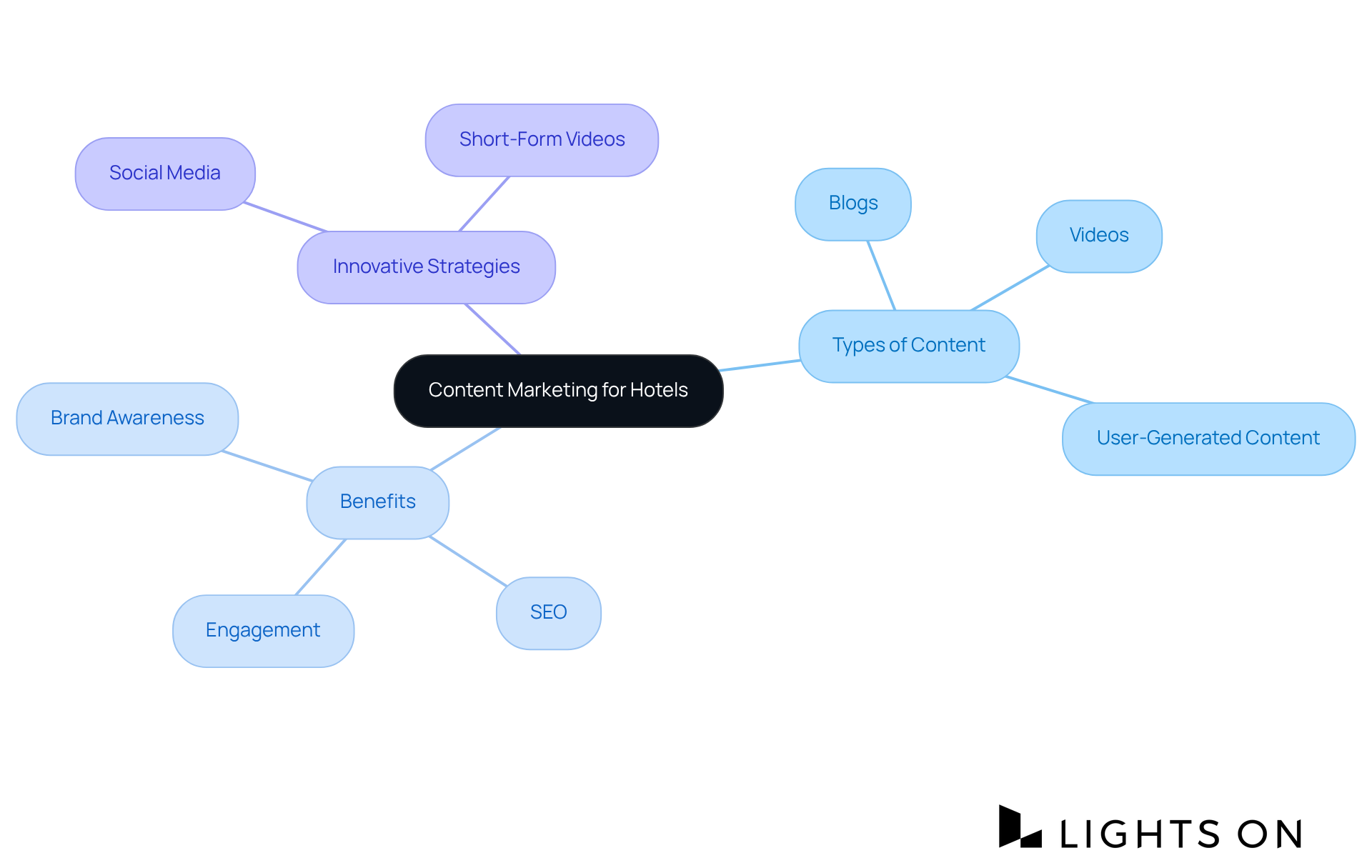
Enhancing the reservation system is vital for establishing a seamless and user-friendly experience, which can significantly elevate conversion rates. Key features encompass:
Research shows that websites taking longer than three seconds to load face increased bounce rates, underscoring the importance of speed. By implementing clear calls-to-action and minimizing the steps needed to finalize a reservation, establishments can drastically reduce abandonment rates. Furthermore, offering adaptable payment options, including multi-currency support and Buy Now, Pay Later features, not only boosts client confidence but also stimulates reservations. fosters trust and eliminates the need for guests to leave the platform, thereby ensuring that revenue remains in-house.
Additionally, integrating AI and machine learning into reservation systems can deliver tailored content and offers, further enhancing the user experience. Exceptional visuals are equally critical; accommodations displaying over 20 high-quality images per room can see up to 136% more reservations. By focusing on these strategies, including the implementation of loyalty programs to encourage direct bookings, establishments can effectively enhance their reservation conversion rates in 2025.
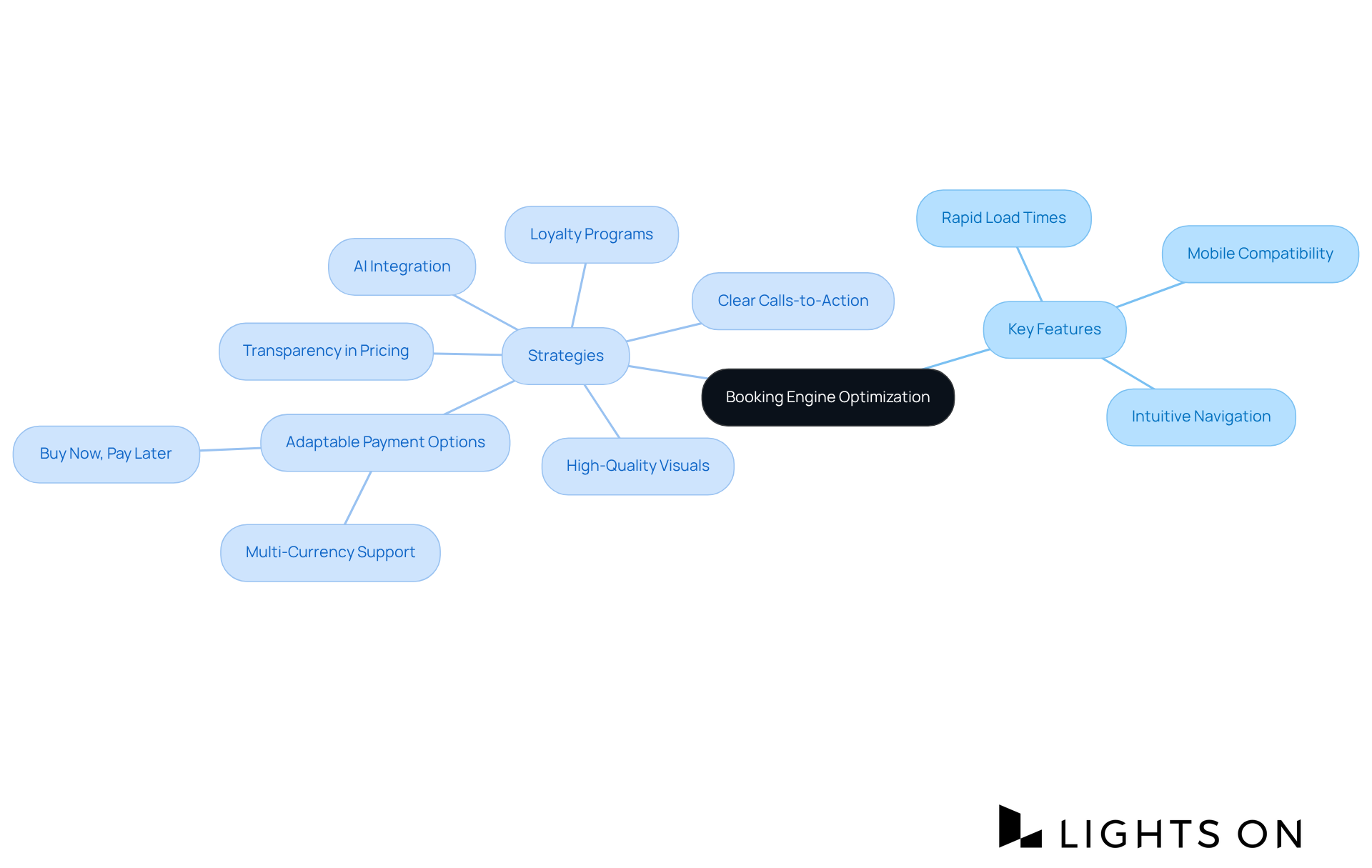
Collaborating with online travel agencies (OTAs) is a strategic move that can significantly enhance an establishment's reach and visibility within a competitive market. OTAs come equipped with established audiences and substantial marketing budgets, which can lead to a marked increase in traffic to accommodation listings.
While the primary focus should remain on , leveraging OTAs is crucial for attracting visitors who might not discover the establishment through other channels. To capitalize on this opportunity, establishments must ensure competitive pricing and effectively highlight their unique selling points on these platforms.
This approach not only draws potential guests but also aids in navigating the complexities of the current booking landscape, where OTAs frequently present lower rates in a significant percentage of searches. By strategically managing their presence on OTAs, accommodations can enhance their visibility and ultimately drive revenue growth.
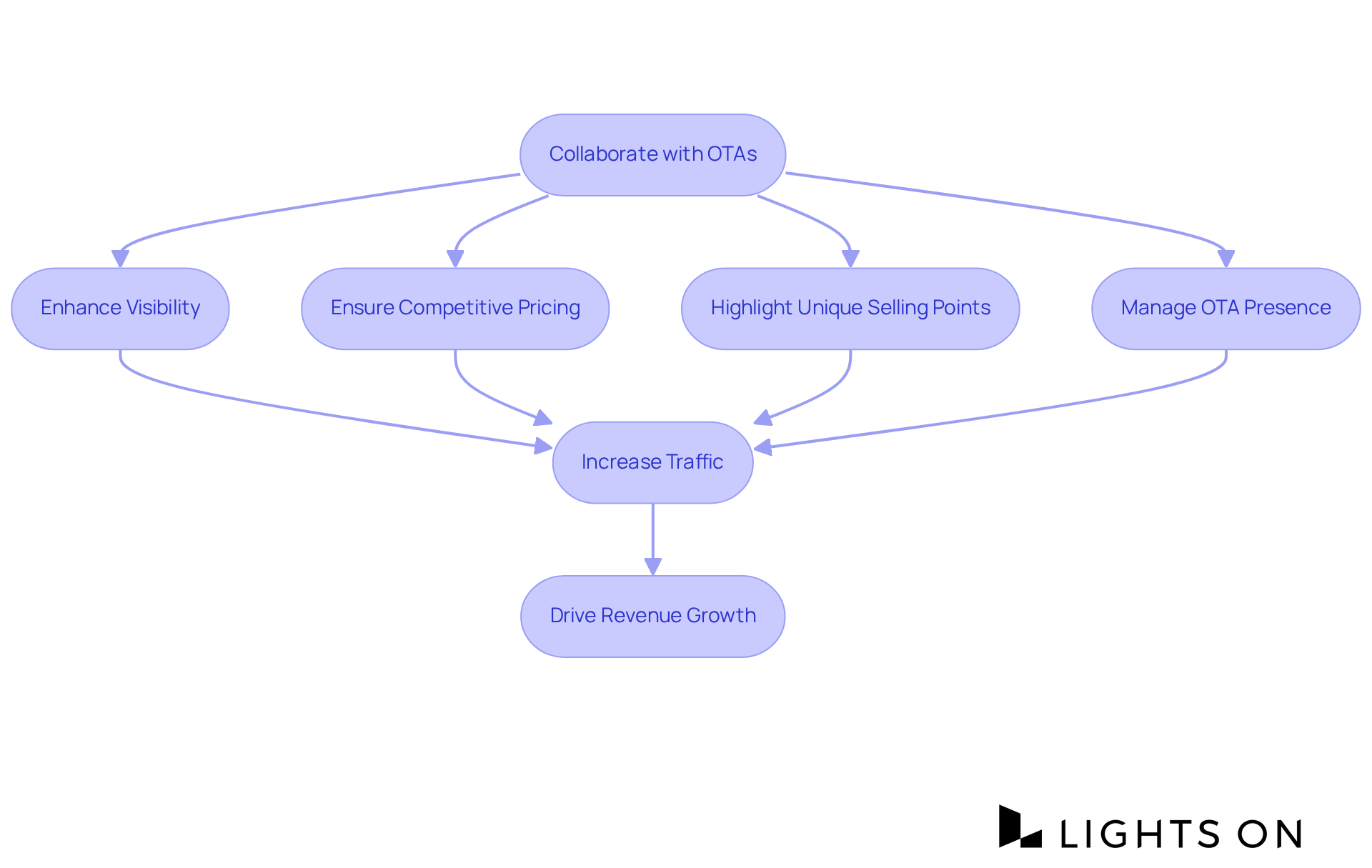
Analytics Tools: Leverage Data for Strategic Marketing Decisions
Analytics tools are indispensable for hotels seeking to elevate their marketing strategies in 2025. By closely monitoring key performance indicators (KPIs) such as website traffic, conversion rates, and visitor demographics, hotels can uncover critical insights into their promotional effectiveness. Consider these actionable strategies:
Regular evaluation of these metrics not only aids in identifying emerging trends but also facilitates prompt modifications to promotional strategies, ensuring establishments remain competitive in a rapidly evolving environment. In fact, establishments that embrace are 19 times more likely to be profitable, underscoring the critical role of analytics in driving revenue growth and enhancing guest experiences. Furthermore, the integration of AI and machine learning is vital for establishing robust data foundations and fostering innovation, while the demand for mobile and contactless technology is projected to become standard by 2025, further transforming the business landscape.
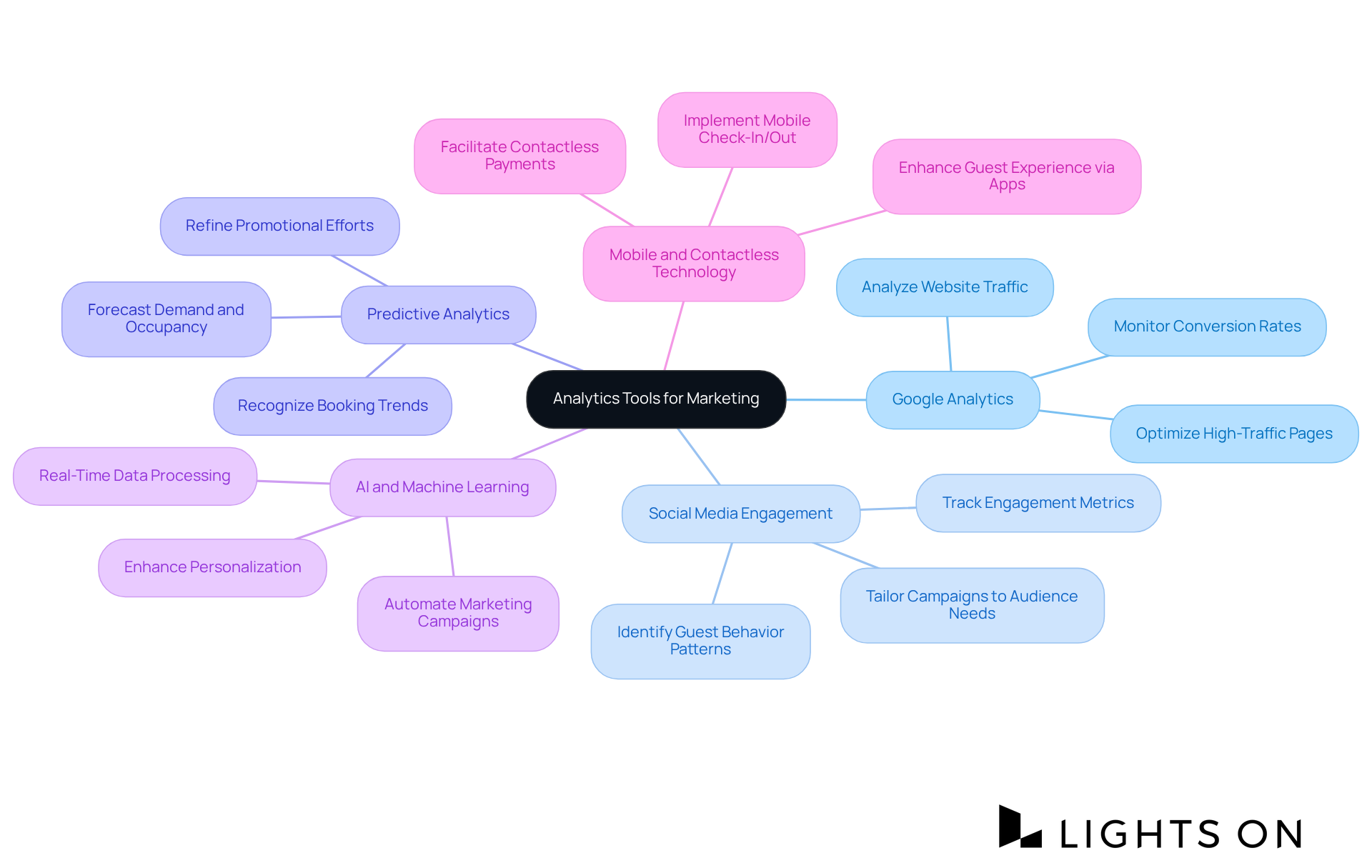
Influencer marketing is a powerful strategy within internet marketing hotel, utilizing partnerships with social media influencers who can authentically promote offerings to their followers. To maximize effectiveness, it is essential for accommodations to select influencers whose audiences align with their target market, thereby significantly enhancing visibility and credibility. The captivating content produced by these influencers showcases the unique lodging experience, effectively generating interest and driving reservations.
Furthermore, the incorporation of user-generated content from guests extends the establishment's reach while fostering a sense of community and trust. Notably, 92% of consumers trust influencer recommendations when perceived as authentic, in stark contrast to just 33% for traditional advertisements. This shift towards genuine collaborations is paramount for establishments striving to thrive in a competitive landscape, as it facilitates meaningful engagement with potential visitors and amplifies overall visibility.
To further optimize their internet marketing hotel initiatives, hotels should:
Transitioning from transactional relationships to with influencers can yield more genuine content and heightened engagement, ultimately enhancing bookings and revenue management.
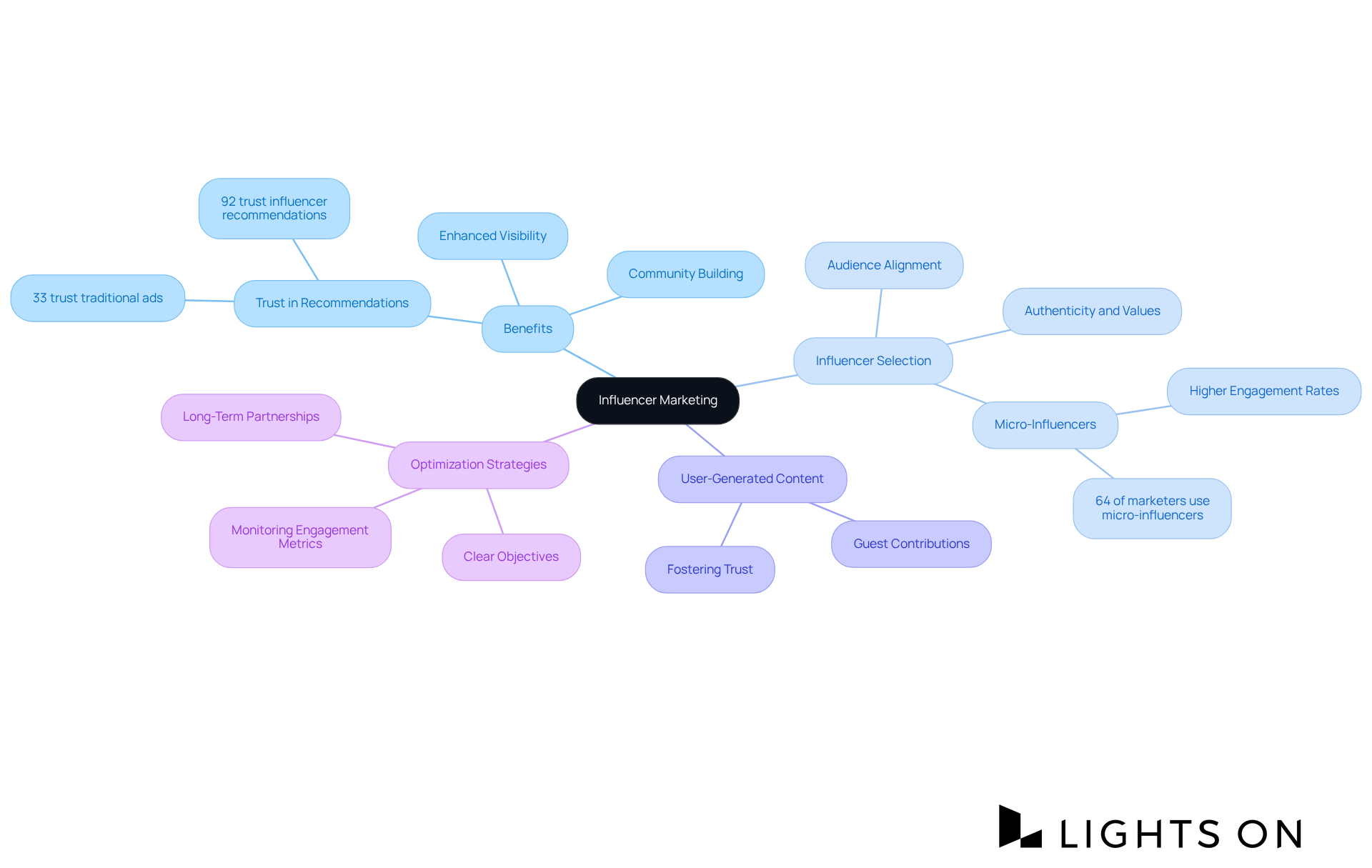
The significance of effective internet marketing strategies for hotels is paramount in today's digital landscape. With over 80% of travelers choosing to book accommodations online, implementing comprehensive digital marketing solutions is essential for hotels to enhance their online presence, engage potential guests, and ultimately increase bookings.
This article has highlighted various strategies, including:
Each of these strategies contributes to a holistic approach that can significantly boost hotel revenue and occupancy rates.
As the hospitality industry continues to evolve, adopting these digital marketing techniques is not merely beneficial but imperative for sustained growth and profitability. Hotels must actively explore and implement these strategies to navigate the competitive landscape effectively. By embracing innovation and leveraging data-driven insights, accommodations will be empowered to attract and retain guests, ultimately leading to long-term success in the ever-changing realm of online bookings.
What services does Lights On provide for hotels?
Lights On offers a comprehensive suite of internet marketing solutions for hotels, including website and content management, performance promotion, social media oversight, search engine optimization, and website design.
Why is internet marketing important for hotels?
Internet marketing is crucial for hotels because over 80% of global travelers prefer to research and book accommodations online. It helps establish a robust digital presence and enhances promotional strategies to engage potential guests and maximize occupancy rates.
How does Lights On enhance financial performance for hotels?
Lights On enhances financial performance through advanced revenue management services, which include pricing optimization and market trend analysis, helping hotels navigate the competitive hospitality landscape.
What are some effective internet marketing strategies for hotels?
Effective strategies include personalized PPC advertising, impactful social media engagement, A/B testing for campaigns, and implementing rewards programs to foster customer loyalty.
How can Google Ads benefit hotels?
Google Ads allows hotels to target specific demographics and geographic regions, ensuring promotions reach potential visitors at optimal times, and helps in crafting compelling advertisements that drive direct bookings.
What role does remarketing play in hotel internet marketing?
Remarketing strategies allow hotels to re-engage guests who abandoned their reservations, boosting conversion rates and increasing direct bookings.
What are some best practices for using Google Ads in hotel marketing?
Best practices include consistently optimizing ad content, segmenting campaigns by device and region, and employing targeted bidding strategies to enhance visibility and engagement.
How can hotels improve their online visibility through SEO?
Hotels can improve online visibility by optimizing their websites with relevant keywords, enhancing site speed, ensuring mobile-friendliness, and producing high-quality content that meets the interests of potential visitors.
What is the importance of local SEO for hotels?
Local SEO is important as it helps hotels attract more visitors from their immediate vicinity, reducing reliance on expensive online travel agencies (OTAs). It includes optimizing Google My Business listings and creating location-specific landing pages.
How can hotels leverage data in their internet marketing efforts?
Hotels can use tools like Google Analytics to track campaign performance, refine advertising efforts, and employ data-driven strategies to maximize the effectiveness of their internet marketing initiatives.
Transform your group booking strategies with Lights On and watch your occupancy soar.